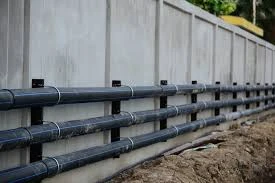Dec . 12, 2024 10:03 Back to list
polypropylene panel
The Versatility and Benefits of Polypropylene Panels
In today's rapidly advancing world, industries constantly seek materials that offer durability, versatility, and cost-effectiveness. Among these materials, polypropylene panels have emerged as a favored choice in various applications, ranging from construction to packaging. This article explores the features, advantages, and diverse applications of polypropylene panels, highlighting why they are becoming increasingly prevalent across multiple sectors.
What Are Polypropylene Panels?
Polypropylene panels are created using polypropylene, a thermoplastic polymer that is known for its excellent chemical resistance, high impact strength, and relative lightweight properties. Typically produced through an extrusion process, these panels can be manufactured in various thicknesses and sizes to suit specific needs. Their inherent characteristics make them suitable for numerous applications, particularly in environments where durability and resistance to environmental factors are essential.
Advantages of Polypropylene Panels
1. Durability One of the most significant benefits of polypropylene panels is their durability. They resist stress cracking, impact, and wear, making them ideal for high-traffic areas and applications that involve heavy use. Their resistance to ultraviolet (UV) rays and moisture helps maintain their integrity over prolonged periods, ensuring a long service life.
2. Chemical Resistance Polypropylene is well-known for its excellent chemical resistance, making polypropylene panels suitable for environments where exposure to harsh chemicals is a concern. This property is particularly advantageous in laboratories, chemical processing facilities, and industries that utilize corrosive substances.
3. Lightweight Compared to other materials, polypropylene panels are lighter, which can lead to significant savings in transportation and installation costs. Their lightweight nature makes them easy to handle, reducing labor costs and enhancing overall efficiency during construction or manufacturing processes.
4. Insulation Properties Polypropylene panels also exhibit good thermal insulation properties, meaning they can contribute to energy efficiency in buildings and manufacturing operations. This quality enables better temperature control, reducing energy consumption for heating and cooling.
5. Cost-Effective Given their durability and low maintenance requirements, polypropylene panels offer a cost-effective solution in the long run. The initial investment may be comparable to other materials, but the lifespan and lack of upkeep needed can lead to substantial savings over time.
polypropylene panel

6. Eco-Friendly With growing concerns about environmental sustainability, polypropylene panels present an eco-friendly option. They can be recycled and repurposed, reducing waste and promoting a circular economy. Additionally, their production often results in lower emissions compared to other plastic materials.
Applications of Polypropylene Panels
The versatility of polypropylene panels allows them to be utilized in various applications across multiple industries
- Construction In the construction sector, polypropylene panels are commonly used for wall coverings, ceilings, and as partitions. Their lightweight nature combined with durability makes them an ideal choice for temporary structures and permanent installations alike.
- Transportation The automotive industry employs polypropylene panels for interior components due to their lightweight and robust nature. They are utilized in dashboards, door panels, and storage compartments, contributing to overall fuel efficiency.
- Packaging In packaging, polypropylene panels are favored for their resistance to moisture and chemicals. They are employed in creating durable containers and packaging solutions that protect products during transport and storage.
- Medical The medical field benefits from polypropylene’s chemical resistance and sterility. Panels made from this material are used in various medical devices, laboratory equipment, and cleanroom environments, ensuring a compliant and safe working space.
- Agriculture Polypropylene panels have found their place in agriculture, where they are used for constructing greenhouses, storage facilities, and protective covers for crops, ensuring longevity and resilience against the elements.
Conclusion
Polypropylene panels represent a remarkable blend of strength, lightweight design, and cost-effectiveness, making them a highly sought-after material across various industries. Their unique properties address many challenges faced by modern applications, allowing for innovative solutions that prioritize durability and sustainability. As industries continue to evolve, the prominence of polypropylene panels is likely to increase, affirming their place as a vital component in the landscape of modern materials.
-
High-Quality PPR Pipes and Fittings Durable ERA PPR & PVC PPR Solutions
NewsJul.08,2025
-
Black HDPE Cutting Board - Durable, Non-Porous & Food Safe HDPE Plastic Cutting Board
NewsJul.08,2025
-
High-Quality CPVC Panel Durable HDPE & PVC Panels Supplier
NewsJul.08,2025
-
Double PE Welding Rod Supplier - High Strength, Durable & Versatile Welding Solutions
NewsJul.07,2025
-
High-Quality PVC-O Pipe Supplier Durable 75mm PVC Pipe & Connections Leading PVC Pipe Company
NewsJul.07,2025
-
HDPE Drainage Pipe Supplier – Durable & Corrosion-Resistant Solutions
NewsJul.06,2025

